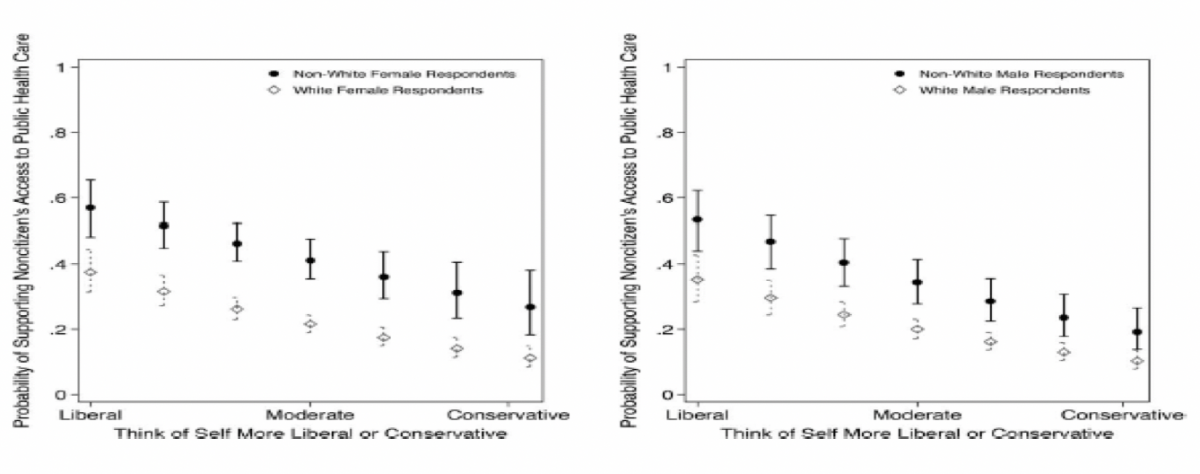American Preferences about Health and Social Programs are Shaped by Intersections of Race, Gender, and Ideology
Connect with the author
Health care was, without question, one of the most hotly debated political issues during the 2016 U.S. presidential election and it remained at the center of public attention afterwards. Public views are strongly divided and many of those who express the strongest opposition to inclusive health care policies are individuals who stand to gain the most from them. Why is that? What factors influence people’s view on this and other major issues about government’s role in social policy provision? Our research offers insights by unravelling the interactive effects of race, gender, and ideology on health care preferences.
The most common explanations for such policy preferences point to economic factors, such as an individual’s income and the likeliness that he or she will need to use health care services. Researchers expect that people with lower incomes and greater likelihood of using health care services will be more likely to support a strong government role in providing affordable health care. But the data on people’s attitudes often fail to fit such expectations, because many people espouse preferences – especially about health care -- that appear at odds with their best economic interests. To develop a different explanatory approach, we use the 2012 General Social Survey data. Our analysis reveals that a combination of factors must be explored to fully understand health care preferences. Race, gender, and ideology all come into play, because – beyond income alone – they profoundly influence people’s social identities, how they understand themselves in relation to others in society and politics.
Why Race, Gender and Ideology are Important
The political economy approach explains social policy preferences by focusing on economic self-interest. But despite the important role economic factors (such as income) play in shaping policy preferences, people often adopt preferences that are not economically beneficial for them. The social identity approach offers an alternative explanation for the policy preferences people express – but most scholars who use this approach look at just one kind of social identity.
Social identities can refer to one’s race, gender, ideology, or other factors that determine group membership. Individuals are not isolated in the world, and instead share in multiple social identities – for example, minority women, male conservatives, white liberals, and so forth. Many explanations for social policy preferences highlight the importance of economic self-interest along one social identity. That is, an individual is expected to adopt the policy stance that is most economically beneficial for one identity they share, such as gender, race, or class.
We believe that a more powerful explanation highlights the influence on policy preferences of intersecting social identities – getting at the multiple characteristics and ties people have. The premise of this approach (called intersectional theory) is that we can learn important things by looking at the interaction of multiple social identities, rather than assuming that each identity has separate effects. Using this approach, we study how race, gender, and political ideology – taken together – affect the health care preferences of Americans. For example, we hypothesize that an individual who has a dominant racial identity (white), a dominant gender identity (male), and holds dominant ideological beliefs (conservative) will express the strongest opposition to generous government health care policies. In contrast, we expect an individual who is minority, female, and liberal to express the strongest level of support for generous health care policies. Our analysis explores all the possible identity combinations to get at the full range of outlooks.
The Effects of Race, Gender, and Ideology on Health-Related Preferences
To illustrate the value of our approach without presenting all combinations, we present here our findings on Americans’ attitudes towards publicly-funded health care services for non-citizens. We studied the interactive effects of race, gender, and political ideology, while also controlling for other factors known to shape people’s attitude toward non-citizen access to health care.
Support of Non-Citizens’ Access to Public Health Care by Gender, Race, and Ideology

The figure on the left portrays women and the one on the right men. In each figure, the preferences of non-white minorities are indicated by the black, solid lines, while the preferences of whites are portrayed by gray, dashed lines. In each figure, the political ideology scale moves from liberal on the left to moderate in the middle and conservative on the right of the figure. Focusing on the interactive effects of race, gender, and ideology, our findings align with our expectations. Across the entire ideology scale, minority women are more supportive of non-citizens having access to government-provided health care than white women; and a similar pattern hold for men, because minority men are more supportive of non-citizen access than white men (although the preferences of minority, male, conservatives and white, male, conservatives are comparable). In both figures, there are obvious differences due to ideological beliefs —differences often missed in studies that consider only race and gender. Race, gender, and ideology obviously all come into play when people form attitudes about government’s role in health care provision – and likely also combine to shape attitudes about social programs as well.
Read more in Zhu, Ling, and Kenicia Wright. “Why do Americans Dislike Publicly Funded Health Care? Examining the Intersection of Race and Gender in the Ideological Context” Politics, Groups, and Identities 4, no. 4 (2016): 618-637.

